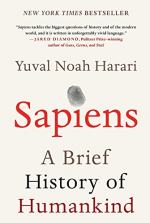|
This section contains 1,203 words (approx. 4 pages at 400 words per page) |

|
Summary
Chapter 3 examines the lifestyles of our hunter-gatherer ancestors, which Harari argues can provide insights into our modern psychology. The hunter-gatherer period, after all, was by the longest in our species history. For example, it is widely believed that modern sapiens gorge themselves on sweets because our ancestors would have done the same when they encountered the relatively rare fruit tree. More controversially, some scholars also argue that monogamy is a relatively new development, thus widespread divorce and infidelity results from polyamorous instincts. The author notes that it is difficult to know much about forager societies. Because these groups moved constantly, they had few possessions to leave behind as artifacts for modern researchers. Even modern foragers have been affected by their industrial and agricultural neighbors and thus are not accurate representations. Overall, we can conclude that ancient foragers were likely extremely diverse, thus any...
(read more from the Chapter 3 - 4 Summary)
|
This section contains 1,203 words (approx. 4 pages at 400 words per page) |

|




